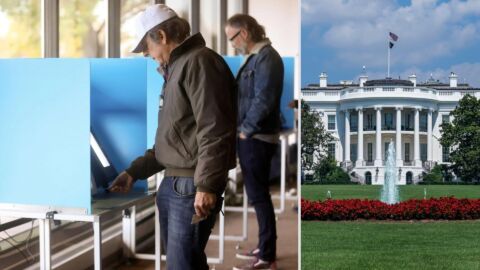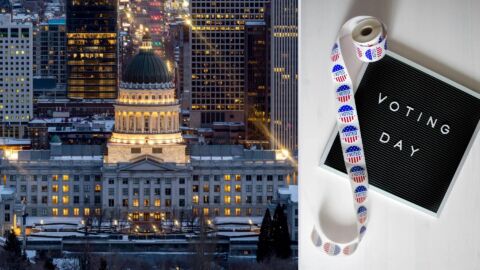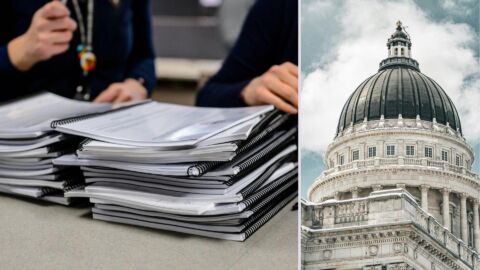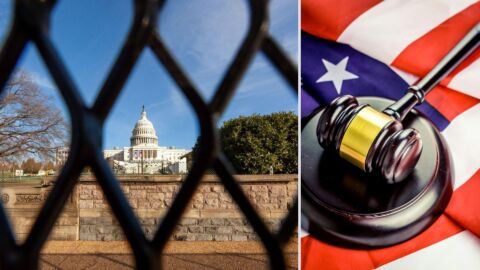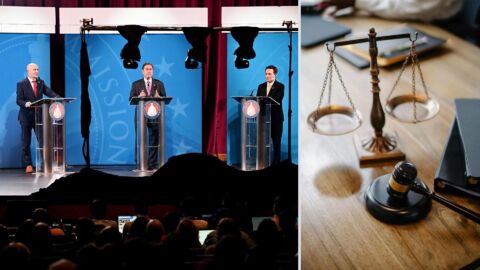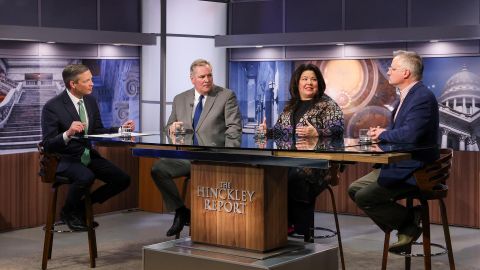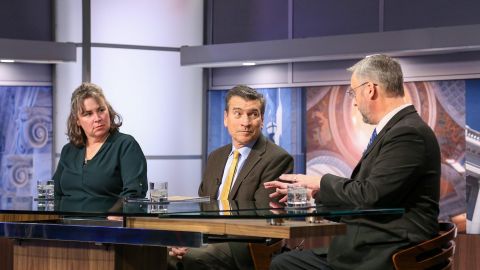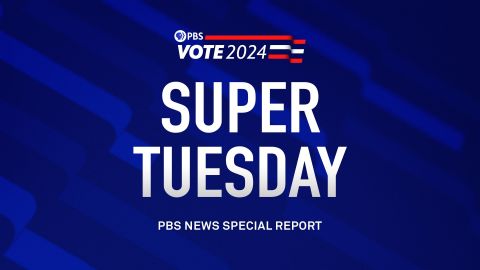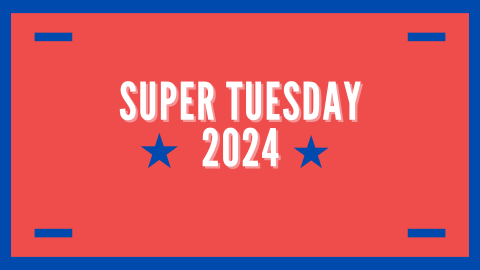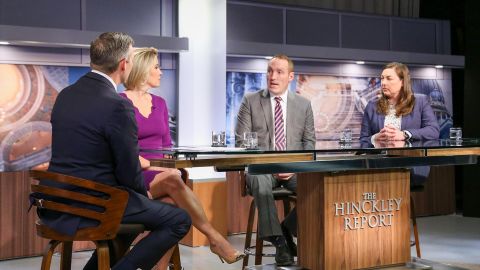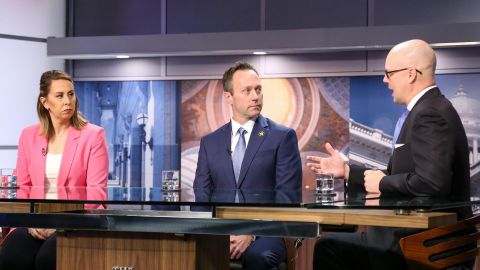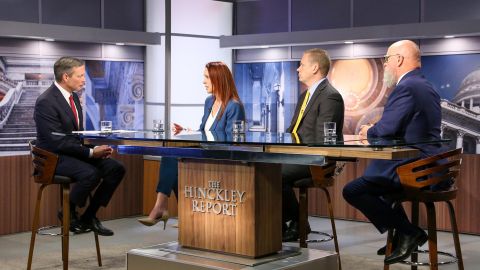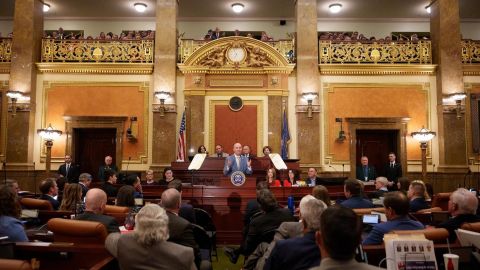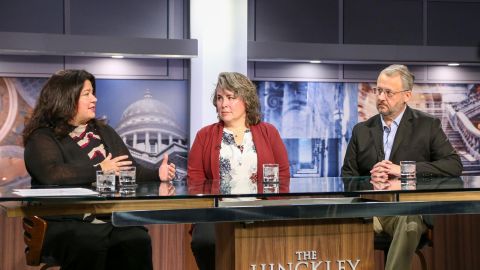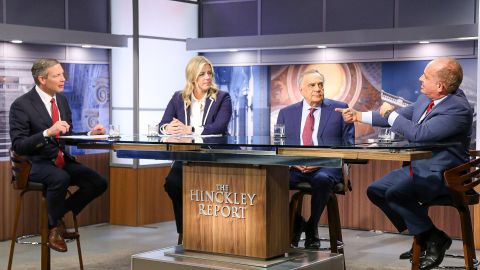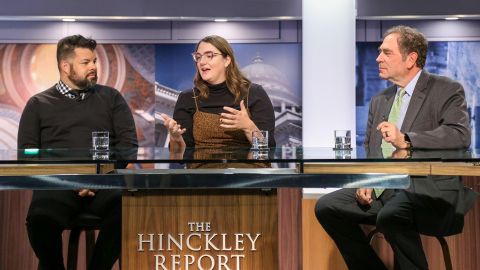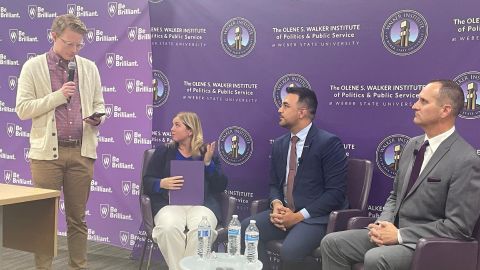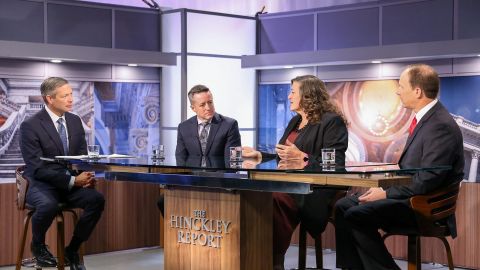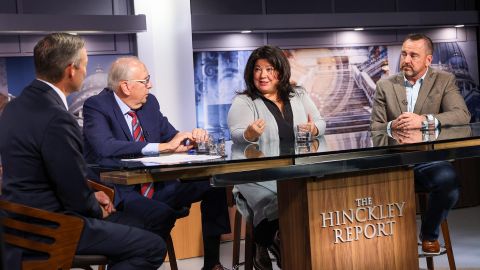♪♪♪ announcer: Funding for "The Hinckley Report" is made possible in part by the Cleone Peterson Eccles Endowment Fund.
Jason Perry: Tonight, on "The Hinckley Report," as election results are finalized, who are the big winners?
And what are the key takeaways for 2024?
With candidates already looking to the next election, will there be a last-minute addition that could shake up the field?
And Utah prepares to welcome the world in more ways than one.
♪♪♪ ♪♪♪ Jason Perry: Good evening, and welcome to "The Hinckley Report."
I'm Jason Perry, Director of the Hinckley Institute of Politics.
Covering the week we have Jeff Parrott, politics editor for the Salt Lake Tribune; Holly Richardson, editor of UtahPolicy.com; and Taylor Morgan, partner with Morgan and May Public Affairs.
We're so glad to have you here this week.
We just finished an election cycle.
We're getting all the results, they're starting to come in.
We see how these candidates fared.
I wanna talk about some of the big winners in races that we were wondering if it would be as close as it actually was, and it was not that close, like, within 20 points.
So Jeff, let's just start with you for a second.
Let's talk about that second congressional district.
Celeste Maloy as of right now, 57% of the vote, well over 20 points ahead of Senator Riebe.
Talk about that race a little bit, particularly in terms of what this signals for this next coming year with that big victory.
Jeff Parrott: I think that race was probably wrapped up shortly after primary election.
We saw--so there was some polling right before the, like, kinda here in the final stretch, it put that about of a nine point race.
That's not what we saw.
We saw about a 25% point win for Celeste, which is about what Chris Stewart had last year.
I think we can also have a discussion or an argument here on whether the legislature has insured if that race is-- or that district's pretty safe for a Republican.
Jason Perry: Yes, go ahead, Holly, talk about that, because that district after the lines were redrawn is even safer than it was before.
Holly Richardson: It's a safe district for Republicans, and I think you can expect that in 2024 that the-- like many of the races, by the time the primary is done, the election's mostly over.
Jason Perry: Well, talk about the rural component, though.
So, it's drawn in such a way that you have urban and you have rural.
We talked about it, we even talked with you about this before the election came.
How big of an influence does rural Utah really have?
Is that what really did it for her?
Maybe it was a safe anyway, but how much did they show up to help pass the primary?
Holly Richardson: I think it was still safe.
I mean, I looked at numbers from Salt Lake County just recently, and she did not win in Salt Lake County, but that's also not unexpected, right?
So, you do have the rural component is important, and maybe it made several percentage points difference, but some of those counties, when you have a very high turnout, it's still, you know, hundreds of votes, not even in the thousands.
Jason Perry: Yeah, go ahead, Taylor.
Taylor Morgan: Well, I think one of the things that was really interesting to me in the second district special election is how rural voters-- and when we say rural voters, we often conflate southwestern voters, St. George, Cedar City.
That's becoming more urban, so they're not necessarily rural.
But there has been a pent-up frustration among those voters over the last two decades with the way the districts have been drawn, and those southern Utah voters have felt that their voice has been outweighed by the Wasatch Front.
And so, I thought it was compelling how they came together to really get behind one of their own in Celeste Maloy.
Jeff Parrott: She really leaned into, I think, that identity, too.
Yeah, I think you're exactly right, that those are becoming more and more urban areas.
But I do think there is some rural identity still there, and you saw those on the billboard sign she purchased after the primary to thank those voters.
Holly Richardson: Yeah, for sure, and even some of her tours, right, her-- the campaign stops.
And right, you're-- I mean, you're in the rural dairies, and you're out on the fields, and you're dressed in jeans and flannel, and it's not just a photo op, right?
She really cares.
Jason Perry: But what's interesting about this conversation though is Celeste enjoyed a couple of days having been sworn in, and she already has a potential challenger from St. George, Taylor.
Taylor Morgan: Yeah, that's exactly right.
Celeste Malloy came from being a staff member in former Congressman Chris Stewart's office.
She had no name ID coming into this race.
She had no money of her own.
She was up against some really big names and big money at convention and in the primary, and she still won.
And she won with a very smart, I think, retail, rural strategy.
And she has her work cut out for her, but now she's the incumbent.
And the incumbency brings a lot of benefits and powers, franked mail being one of them.
And she's already off to a strong start.
She knows she's up for re-election very soon.
Jason Perry: Yeah, this franked mail is opportunity for these members of Congress to send out materials, not campaign materials, but about what they're doing.
They're in office.
Jeff, as you are out there interviewing people, as you're following this closely, are we gonna see many more candidates that you're hearing about that may jump into this race?
Jeff Parrott: I do think there is probably a pretty strategic decision made here in this last couple weeks to start jumping into that race with these exploratory committees is what we're seeing before you can officially jump into the race.
It was a super crowded Republican field.
I don't know, there's gonna be a lot of different congressional opportunities next year in the 2024 race that we didn't have in this special election this year.
And so, I do think the field might thin out a little bit.
Jason Perry: Yeah, January 2, of course, is the date when people will start being able to file, so we'll see how many people are lined up.
Let's talk about another local race, Holly.
This big race between Erin Mendenhall and Rocky Anderson.
And this is one we talked about across the state because our capital city had some things at stake and ended up not being very close at all.
Holly Richardson: Yeah, not very close at all.
I think Mayor Mendenhall showed, in fact, one of the things that she said on election night was that she didn't feel like the voters really listened to the politics of fear, that they were forward-looking and optimistic, and that's why they backed her campaign.
But you know, she pulled in-- I thought it was really interesting at the end, she pulled in bipartisan support, right, by getting endorsements from Republicans, even though it's technically nonpartisan, right.
But we know that Salt Lake City tends to lean a little more Democratic than Republican, maybe a lot more, But she actually did really, really well.
And I think maybe for me, one of the takeaways is she wasn't just a one issue person, and she didn't come across as angry all the time.
Taylor Morgan: I think, unfortunately, former Salt Lake City Mayor Rocky Anderson learned the hard way that in 2023 yard signs don't vote.
And he ran a campaign that was a copy of the last time he ran 20 years ago.
And since that time, all of the modern tools and tactics for campaigns, he was genuinely shocked on election night.
He just didn't run a modern campaign.
Jason Perry: Yeah, it was interesting.
His comments seem to suggest that what you're saying is exactly right, it was that this is not at all what I understood the voters were thinking.
So, we did hear that a bit as well.
Can we talk about support in another category, which is so interesting, because we're trying to line up these candidates, who's going to support them, who might not, and it's important when someone says, "I will not support you."
I wanna talk about some comments from Senator Romney this week, which were very interesting, because he talked about to the question, who would you vote for?
It sounds like a bunch of people, but two in particular he would not.
I want to do this quote, Jeff, and then maybe you can talk about this for just a moment through this lens of your reporting.
This is from Senator Romney in an interview with CBS News.
He said, "I'd be happy to support virtually any one of the Republicans, maybe not Vivek (Ramaswamy), but the others that are running would be acceptable to me, and I'd be happy to vote for them.
I'd be happy to vote for a number of the Democrats, too.
It would be an upgrade in my opinion from Donald Trump and perhaps also from Joe Biden."
Talk about that.
Jeff Parrott: I don't think it was all that surprising that he is interested in finding what I assume is probably a more moderate, centrist candidate, someone that probably reflects the same values that he has voted on and encouraged legislation on through all of his years in office.
And so, I-- no one's surprised that he's not going to support Donald Trump.
I think even there's Democrats that are wavering on a Joe Biden election this year or next year.
I am interested to see who he will cast his ballot for in a few months though, or at least he will endorse as the race gets a little closer in May and June.
Holly Richardson: Well, he's already said, right, that if it's a Biden-Trump matchup, he's voting for Ann Romney.
Jason Perry: His wife will get another vote.
Holly Richardson: Another vote, another write-in vote.
So, yeah, I don't think it's surprising, right?
It's the, no, he's not running for political office, right?
Because he's, you know, torpedoing all the ships, but he's out there saying what lots of other people are saying too.
We wish that there were other choices at the top of the ticket besides Trump and Biden, right?
Jason Perry: So Taylor, we've even had our own governor in a recent-- say, "We're just looking for two other people to be on that ballot."
Talk about how deep that runs.
Taylor Morgan: I think voters throughout the country are frustrated with having the same old choice again, potentially, between Donald Trump and Joe Biden.
Holly Richardson: And I think old might be the right word here, right?
Taylor Morgan: Literal, yes, we're talking literal.
And we've heard this, even Senator Romney said that he's looking for new leadership among the new generation.
I really respect that, I think that's correct.
Personally, I really like Nikki Haley.
And I understand why he's not doing it, but I wish Mitt Romney would come out and endorse someone specifically by name.
The op-ed that he wrote in the Wall Street Journal, he called on Republicans who aren't viable to get out.
We have seen some of that with Republicans dropping out.
It is time for Republicans to coalesce behind one strong candidate, whether it's Ron DeSantis, who's less strong, or Nikki Haley, who is rising in all of the polls.
Jeff Parrott: Is the party in a place where they can coalesce though?
Is the Republican Party so fractured so much?
Taylor Morgan: No, I'm just 'dreaming.'
Jason Perry: Well, let's pick up on the Nikki Haley candidacy for just a moment.
Holly, you did some great writing about this.
I'd love to hear some of the historical perspective, but she picked up a pretty big endorsement this week from the Koch network.
Holly Richardson: Yeah, she did.
So, Americans for Prosperity has been knocking doors for her, and not-- they hadn't been specifically talking about her candidacy, but anybody but Trump.
And now they're specifically backing Nikki Haley.
It's a big deal, right?
It's a big deal in the state of Utah.
They do play in our political local politics.
So, she's done well, and she continues to do well.
But here's the problem.
Even though she's rising in the polls, she's still significantly below Donald Trump.
So, she can beat Biden, but can she beat Trump?
That's the key question.
Jason Perry: We had another interesting visitor this week to the state of Utah.
Robert F. Kennedy Jr., running as unaffiliated, running as a third party candidate, had a rally just this week.
Jeff, let's talk about that a little bit.
I know you've all done some reporting on that with the Tribune.
He's received about $78,000 in donations, but all he needs to get on the ballot in Utah as an unaffiliated is 1,000 signatures.
Jeff Parrott: And Brian Shaw went to that last night, heard the stump speech.
There was certainly his brand of conspiracy theory peddling during that stump speech.
Brian also reported, and like when we talked about it last night, there was quite the army of--small army of signature gatherers there, which is exactly what you're talking about.
If he only needs 1K to get on the ballot, certainly you could see a world where he is on Utah's ballot.
Taylor Morgan: Let's not forget, Kanye West was on the presidential ballot in Utah in 2020.
So, if Kanye can do it, then certainly RFK Jr. should be able to do it.
Jason Perry: Yes, so talk about the calculus.
This is all by law in Utah, and we kind of looked this up.
If you wanna--if you're a qualified political party for Senate, you need 28,000 signatures, Congress 1,000, Utah Senate is 2,000, and the Utah House is 1,000.
Holly, this is interesting, you know?
If you are not affiliated with the party, the bar is pretty low to get on the ballot in Utah.
Holly Richardson: Yeah, that all goes back to SB 54 some years ago, right?
Taylor Morgan: I'm sorry, my apologies.
Jason Perry: Yeah, we'll assume you're part of that.
Holly Richardson: About having an alternate path to the ballot, and I think one of the things that has happened is that the the political parties have wanted to make it actually a little harder to get in that way, maybe a lot harder.
It's hard to get that many signatures.
It is, it takes either a lot of time, a lot of money, or both, right, to get that many.
Jason Perry: Speaking of time and money, I think we have to talk a little bit about our open Senate seat with Senator Romney leaving.
Because Jeff, we've been hearing from a lot of folks out there that even though he was out for a while, John Curtis, Congressman John Curtis, in the very near future may announce that he is indeed going to run for the Senate.
Jeff Parrott: Yeah, and I think Brad Wilson, who got into this race pretty early with that tactic of, you know, an exploratory committee, has been the front runner and has enjoyed that front runner position for the last several months.
And I do think that changes if Curtis does jump into that race here soon.
Jason Perry: To that great point, Holly, a lot of the big donors, the supporters in the state were kind of operating as if he wasn't going to run.
That calculation is really changing quickly.
Holly Richardson: Yeah, sure, and what we've seen in previous races, right, Utah is friendly, and we're nice to each other, generally speaking, and they'll probably donate to John Curtis as well.
I think one of the things that Brad may face is two things.
One is the idea that Speaker of the House has broader name recognition than they actually do.
They think they have broader name recognition than they do.
But the second one is sometimes the frontrunner is the one that takes all the firepower, and so he's been out there for a while, but I think when John Curtis, if he jumps in the race, he's going to immediately become the frontrunner because of his national standing.
Taylor Morgan: I think that's exactly right, Holly.
I think that Brad Wilson in the latest polling he was at 5% -ish.
Name ID is his issue.
As Speaker of the House, he's well known among insiders, but not the general public.
John Curtis, however, having been in Congress for many years and having the benefit of that incumbency and name ID, I would expect him to be polling in the 30% range as soon as he gets in this race.
Jason Perry: Talk about how this change is going to--this race is going to change the strategy, because some of these other candidates, and there are quite a few of them, Taylor, would fall pretty much to I would say to the right of the political spectrum.
Where is the space for a John Curtis or a Brad Wilson?
Taylor Morgan: Well, I think we are seeing that when we get to a primary, a Republican primary among a broad swath of Republican voters, a more moderate Republican has a chance to win if it's a primary that involves all Republicans in the district.
Going through the convention route is not necessarily John Curtis's best option.
However, he did win at convention only last go around.
He did not collect signatures the last time he was reelected.
Jason Perry: But Holly, you said he's not going to make that mistake again.
Holly Richardson: Yeah, I'm sure that that is true.
I would say with John Curtis also, because of redistricting, and his district changed significantly with the 2020 redistricting, so the new district in '21, and he now has the Uinta Basin, he's, you know, the climate guy, the conservative climate caucus guy, he's been able to win them over in Uinta Basin.
Plus, he's had all the ones that are down underneath Utah County.
And I think he is-- he's already well known in many of the areas of the state, and I think he has a lot of practice with dealing with maybe less favorable audiences and winning them over.
And I think it does change the dynamic in the race for sure.
And it changes the dynamic in the third congressional race as well.
Jason Perry: Yeah, I think we have to talk about that, right?
So, if John Curtis jumps in, Jeff, this becomes a pretty interesting open position.
Just yet again, another congressional seat open.
Jeff Parrott: Yeah, and I'll go back to what I said about the second district race too.
I do think because there are going to be four different congressional races and a pretty high profile Senate race, it is gonna thin the field a little bit as folks vie for where they think they are most eligible or could be successful.
Jason Perry: Any of you hearing any names right now?
Holly Richardson: Yeah, sure, I've heard Mike Kennedy might jump in.
Jason Perry: Senator Mike Kennedy, state senator.
Holly Richardson: Chris Herrod, former representative in the House.
He's run multiple times against John, but maybe without John he could win.
Taylor Morgan: Holly Richardson?
Holly Richardson: Not part of the conversation.
Taylor Morgan: Amelia Powers Gardner, perhaps.
Holly Richardson: Yeah, Adrielle Herring, I think, would be a great choice.
Maybe Michelle Kaufusi, I haven't heard her name, but she would be, you know, I think, a strong candidate if she were to get in.
Jason Perry: Yeah, it's so interesting to see how the dominoes fall and the board changes in such a dramatic way.
Jeff Parrott: But again here, all Republicans, right?
We haven't mentioned Ben, we haven't mentioned some other, you know, Gale, others that could jump in that race.
But yeah, but I just don't see that there's a viability.
Holly Richardson: Who's gonna be the sacrificial candidate from the Democratic side?
Jason Perry: Well, a lot of open races though, so a lot of time for us to see what happened there.
Let's talk about ramifications of decisions for just a moment, because we've had a couple interesting developments in D.C. and here at home.
I want to talk about fresh news just happening.
Jeff, George Santos, expelled from the House in Washington D.C. Jeff Parrott: Facing, I think, multiple felony charge, or felony accusations, felony charges, was just kicked out.
Utah's four Republican members of Congress and now Celeste Malloy, you know?
Maybe her first vote, I think, yeah?
Holly Richardson: Her first vote was to actually recognize Israel.
Maybe second.
Jeff Parrott: All voted to expel the congressman from New York.
Taylor Morgan: Shocking.
There are consequences in the U.S. House of Representatives for bad behavior.
Holly Richardson: But I would just say this is the third vote, right?
So, one of the things that happened in between the second and the third, the vote to expel, was the House Ethics Committee investigation concluded, and they released the report, and it was very damning, multiple allegations of federal offenses.
And I think that was the kicker, right?
There were several who supported not expelling last time just because he felt like-- they felt like he hadn't had due process, but now that that's happened, he's gone.
And so, the Republican majority now is down by one again.
Jason Perry: Let's talk about what's happening in our local attorney general's race here, because lawsuits have been filed this week.
Taylor, if you'll take a second on this, Attorney General Sean Reyes, a lawsuit.
And this saga continues with our legislature deciding to take some action as well.
Taylor Morgan: That's right, the legislature voted to conduct an audit.
This is a function of the legislative auditor general's office.
It is not a political audit.
This is purely a legal process audit that happens regularly.
I think it's possible that criminal charges could come.
I would look for the civil lawsuit that has been filed against Sean Reyes to also result in criminal charges in discovery.
And look, we have had bad behavior in the office of Utah's attorney general for the last three office holders.
That office is in shambles.
Something has to be done, and whether it's changing it to an appointed office, I don't know.
Sean Reyes was also appointed under different circumstances.
But certainly I think more and more will come out about Sean Reyes, and it's only a matter of time until he's criminally charged.
Jason Perry: Well, there's definitely some other candidates that are interested in that position.
Derek Brown has already launched an exploratory committee, right, Jeff?
And we have maybe even a legislator or two who may be interested in this seat.
Jeff Parrott: Well, before I think we jump into the other candidates, the most interesting thing that I saw from Brown was Gary Herbert, you know, kind of, like, heading up the committee.
Taylor Morgan: Appointed Sean Reyes 11 years ago.
Jeff Parrott: Yeah, yeah, yeah, that's a big deal.
Jason Perry: Yeah, and we do see other folks that are looking at that particular race, and it's interesting to see if they will get legislation about whether or not at some point that becomes appointed or not to Taylor's good observation.
Let's talk about the state of Utah for just a moment, because some big things have happened this last week, some announcements in particular.
And Taylor, talk about this first one because we're closely connected to it as well through the Hinckley Institute and the University of Utah.
We are going to have a 2024 presidential debate.
Taylor Morgan: Yes, very exciting.
It will be held right here at the University of Utah.
The U has done a great job of pulling these off and really setting a standard for these debates.
How many people will be on the stage, Jason, is the question that we should be asking.
Jason Perry: So, people are wondering, so, those are wondering, can there be more than two?
The answer is yes, there can be.
Holly Richardson: Can there be less than two?
The answer is yes.
Jason Perry: I don't know, we always thought about how that might work if there's only one person, but that is an interesting point.
Talk about the significance of that, kind of on the Utah presence on the national stage, Holly.
Jason Perry: Well, I think one of the things that we say in Utah a lot is that Utah punches above its weight.
And we see that in some of the committee assignments that we have on the federal level, and we see that in some of the other things that are happening in Utah news.
But the ability to host a presidential debate I think is phenomenal, right?
It's saying, look, we really are players, even though the state doesn't have as many voters as, you know, some counties, but we are a player, and we're a factor, and I think that's great.
Jason Perry: Yeah, so Jeff, that's so interesting, because not just that it's coming here for the second time.
We had a vice presidential debate in 2020, which went well, the fly notwithstanding which became a-- Taylor Morgan: That debate killed Mike Pence's presidential run in 2024, just in fairness, Jason.
Jason Perry: That was the one?
Taylor Morgan: The fly on the head.
Jason Perry: Oh, it's so real.
He's never recovered.
Attribute it to the fly.
I think he said something like he was one fly away from a perfect debate.
But talk about this debate generally for Utah and the country, Jeff.
I mean, what kind of impact can these have on the country, particularly given the sort of the discussion we're having about who the candidates might be?
Jeff Parrott: I wanna push back a little bit, Jason, because I'd be interested in having a quick conversation on whether we think debates are worth it and whether it's worth it for candidates, whether it's worth it for voters.
I do think there are great opportunities, and we're all politicos, and probably debate junkies and love watching these things, but I'm not sure how much the average voter is keyed in.
But I know I'm pretty excited to have the debate here, but I'd love to hear what you guys think.
Holly Richardson: I think it's interesting.
I don't love debates, I love to yell at the TV when I watch them.
But I think one of the things that it does is it allows sound bites for advertising for their opponents, usually.
Sometimes for themselves, right?
Because nobody can give you a solid answer in 60 seconds, right?
You can't have a deep policy discussion in 60 seconds.
But I know people do watch, and they make choices on who they're gonna vote for based on the debate.
Jason Perry: Yeah, go ahead, Taylor, because particularly your point, sometimes it might not throw you over the top, but it could sure bring you down.
Taylor Morgan: Well, I'm pretty skeptical of debates, Jason, and I want to be careful because that skepticism is based on my experience as a campaign consultant.
And typically, my advice to a candidate, if they're the incumbent or the front-runner, you have no reason to do a debate.
It can only hurt you.
However, if I take that hat off, just as a citizen, I like debates, I like the engagement.
Candidates should have to answer tough questions.
We have seen how debates have helped Nikki Haley, for example, rise in the polls and connect with voters.
So, there is some value, but also Donald Trump is winning by not doing debates.
Jason Perry: You have to watch that closely to see if he is the nominee, if he decides to participate.
A hundred plus million people watching his screen sometimes is a nice stage.
Really quickly, before we close, another big announcement for the state of Utah.
So, Jeff, the state of Utah, Salt Lake City has been selected as a preferred site for the 2034 Olympic Games.
This is huge.
Jeff Parrott: Yeah, it's great.
I'm excited.
I cover politics, I don't cover sports.
I spent a lot of time this week figuring out how to, like, make sure we're, like, spelling Olympians right, and some of these smaller efforts as our politics reporters were covering that.
I think it'll be great for the state.
I do think there is gonna be a decade of kind of getting the state in shape.
I know there's, at least here in Salt Lake City, there's gonna be some efforts to turn some roads into some boulevards.
I know the mayor has talked about a green loop.
You know, we've talked about here in the city.
I wasn't here in 2002, I was living in Ohio at the time.
You guys might be able to better say kind of like what that lead-up looked like before '02.
Jason Perry: Yeah, talk about that for a second, Holly.
Holly Richardson: It looked like construction on I-15.
Jason Perry: We had a lot of that.
But what's interesting talking about you mentioned the mayor, the governor, all elected officials, this seems to defy political party in terms of the support.
Holly Richardson: I think one of the great things about the 2002 Olympics that I'm sure will translate to another Olympic Games is the number of volunteers that we can get from Utahns, right?
It's one of the things that really redefined how Olympic Games were run, and we can thank Mitt Romney for that, maybe.
I don't know.
But he can take the credit.
But we, as a state already, are high in volunteerism, and I'm seeing people already saying, "I was just a baby, I can't wait to volunteer, right?"
Or, you know, in my case I had really young kids and I didn't have the time, but I'm planning on volunteering, right?
It's just-- it's amazing.
So, I think we'll see a lot of that.
Taylor Morgan: Yeah, look, we love the Olympics here in Utah.
We did it very well in 2002, I do not want to rain on that parade, But if you get into the details of 2002, the reality is, is that huge amounts of federal security dollars came in to subsidize our 2002 Olympics.
Without the unprecedented amount of security-focused dollars, right, following 9/11, our games would not have been profitable in 2002.
Hopefully we can figure out a way to get that money coming back.
Jason Perry: He'll still volunteer.
That's gonna be our last comment today.
Thank you for your comments and thank you for watching "The Hinckley Report."
This show is also available as a podcast on PBSUtah.org/HinckleyReport or wherever you get your podcasts.
Thank you for being with us.
We'll see you next time.
♪♪♪ ...

